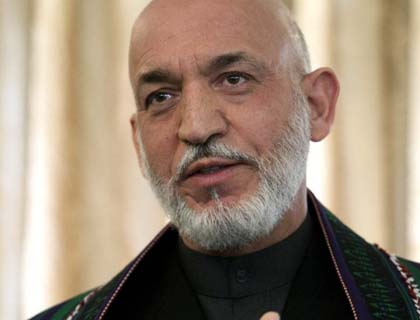KABUL – President Hamid Karzai ordered on Saturday that only Afghan forces may carry out special operations and night raids, and not NATO troops — an effort meant to stymie popular anger over the international troops' nighttime assaults that he said kill civilians.
President Karzai's announcement also said the international coalition should not proceed with any raids that have not been coordinated beforehand with the Afghan side.
It wasn't immediately clear what impact, if any, Karzai's orders could have on NATO's actions. The coalition promptly defended the raids as a necessity to flush out insurgents from their hideouts.
"We can achieve the mutual objectives we share with President Karzai only by having night operations as a component of the overall campaign," NATO said in a statement, made available to The Associated Press.
However, NATO indicated there would be a gradual handover, saying that "we know that we must move from Afghan participation in night operations to Afghan forces having responsibility for night operations."
The alliance claims that all such operations are conducted jointly with Afghan forces.
The Afghan public, which has grown increasingly hostile to foreigners as the nearly decade-long war continues, tends to perceive the NATO raids as capturing the wrong people or mistreating civilians during searches of private homes and compounds.
Karzai repeatedly has criticized the raids, though this was his first tangible effort to stop them.
"Such operations most of the time have caused civilian casualties and the dissatisfaction of the Afghan people with the government," he said, adding that the raids go "against the national interest of the Afghan people as they struggle against terrorism."
The order came as Karzai left Afghanistan on Saturday for a six-day trip to Turkmenistan and Italy.
NATO argues that the raids by special operations forces have been extremely effective in devastating both the insurgency's leadership and many of its fighters.
According to figures NATO supplied to The AP, in the six-month period from November to May, special operations forces conducted more than 3,240 operations, killing or capturing about 870 insurgent leaders. NATO also said that more than 4,380 insurgents were captured, and more than 1,170 were killed.
Last week, 12 people died in a violent protest in northern Afghanistan after a NATO night raid there killed four people. NATO said the joint operation by U.S.-led coalition forces killed four insurgents — including two women — who tried to fire weapons at the soldiers.
Protesters, however, carried the bodies of the dead through Taloqan, the capital of Takhar province, claiming they had been gunned down in their home for no reason. An estimated 1,500 people later clashed with police and tried to storm a German military base, shouting: "Death to Karzai! Death to America!"
The riot suggests more trouble ahead for NATO as upcoming troop drawdowns are likely to make the alliance increasingly reliant on quick-strike raids on insurgent hideouts. The raids often produce prominent results — most recently, the May 2 killing of Osama bin Laden in neighboring Pakistan — but deeply offend Afghans when they go wrong.
Distinguishing militants from civilians can be difficult in many areas. Entire villages are thought to be allied with the Taliban or other insurgent groups.
Meanwhile Saturday, NATO said a bomb blast and a separate insurgent attack in southern Afghanistan killed two coalition service members. NATO provided no further details on the deaths, which bring to 44 the number of international service members who have been killed this month. This year, 195 coalition troops have died in Afghanistan.
Southern and eastern Afghanistan are the country's most volatile areas. Also Saturday, a suicide car bombing in eastern Kunar province wounded a police officer.
The recent violence is part of the Taliban spring offensive, with stepped-up roadside bomb and suicide attacks, as well as insurgent assaults on mountainous or rural outposts.
The effectiveness of the Taliban campaign could affect the size of President Barack Obama's planned drawdown of U.S. troops in July. NATO is to hand over control of security in the country to Afghans by 2014. (AP)

